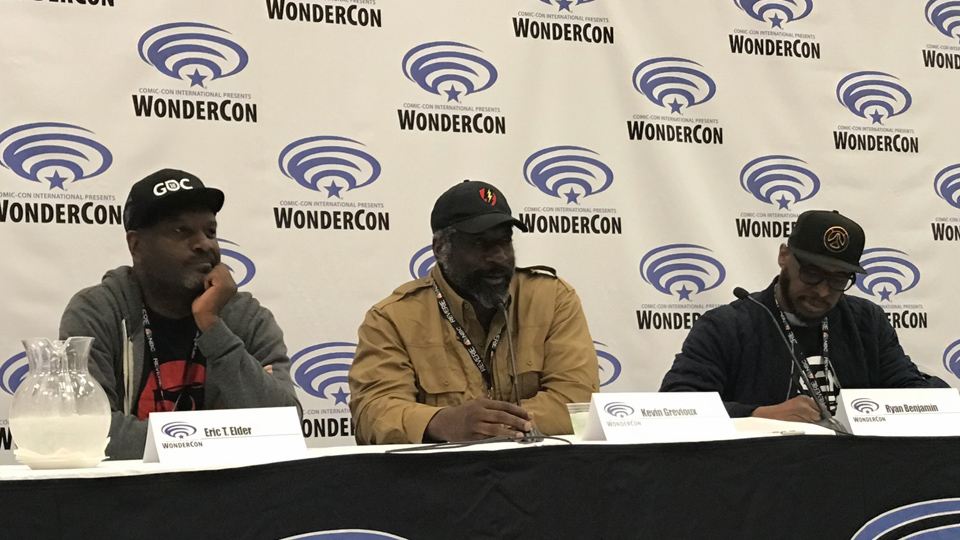
As of now Marvel’s Black Panther has become the top-grossing superhero genre film of all time. The Ryan Coogler directed cultural phenomenon is also a film with a virtually all Black cast. Coogler himself is a young African-American, along with various other people of color who took the lead behind the scenes of the film.
Hollywood is no stranger to Black movies, even Black movies that are successful at the box office. Yet, Hollywood is also no stranger to having an issue with acknowledging the profitability of diversity and representation in film and the creative industry. Due to this, Black Panther’s continued success has many wondering if there will be a tide change when it comes to representation, and how to take advantage of this moment for Black creatives paving their way into the industry.
Such a topic was grappled with at a recent panel at the annual WonderCon convention. The panel, “Blacks in Entertainment: Designing for the Culture” discussed the topic of “what next” for Black workers in the industry, and how to succeed against discrimination.
Over 60,000 comics, film, television, science fiction, animation and art lovers descended into Anaheim California for the annual WonderCon convention from March 23-25. The annual convention, which began in 1987 where it originated in Oakland California, boasted a wide array of exhibitors and attendees from across the country. In addition to shows and vendors, the convention held a number of speaking panels on various topics dealing with the creative industry. “Blacks in Entertainment: Designing for the Culture” was one of the more socially conscious panels as it dealt with race and employment in the creative field.
The panel featured actor and screenwriter, Kevin Grevioux (The Mask, Underworld), and comic book artist Ryan Benjamin (Batman, Ultimate Spiderman), along with visual effects artist Veronica Flint, producer Travis Williams (VP, Lightstorm Ent), Microsoft developer Leon Pryor, and animation and video game producer Eric T. Elder. It was hosted by producer Charles Babb who is the founder and CEO of Fairchild Consortium, an augmented virtual reality gaming production company. When Babb posed the question of Black Panther, and what it means for the industry when it comes to race relations, each panelist had varying opinions.
Babb expressed that it was “a new era” at the moment with Black Panther dominating the box office. Grevioux spoke on the importance of the moment, but also his concerns. “I hope it changes the prior mindset. That we can [get to the point] where movies with a large Black cast can be considered just movies, and not “just Black” movies. To be sure, the reason why it [Black Panther] is doing so well is because it’s a Marvel property. The test still remains if Hollywood executives are going to look at this movie and say, ‘You know what? Why don’t we take a chance? Why don’t we create other movies with people of color. [Which includes] Black, Latino, Asian, Indian, and say hey these things can work.’ But it remains to be seen,” Grevioux noted. He went further to explain, “Unfortunately you had Proud Mary that came out a few weeks before and did nothing at the box office,” Grevioux said, referring to the Taraji P. Henson-led film. “Chadwick Boseman [the Black Panther lead actor] did another movie Marshall previously and that didn’t do great at the box office. So what I fear is that they’re going to claim to do a couple of other movies featuring people of color, and that the first one that tanks they’ll claim ‘it doesn’t work’ and then go back to the old ways of doing business… I’m cautiously optimistic.”
Travis Williams jumped in to say that he was “more than optimistic” regarding the new era in entertainment. He explained that he was going a different route of thinking about the industry. “What is important is that extraordinary Black people are taking charge. Black Panther was badass regardless of race. It would have been a hit movie even if the people were orange. We have to get out of this thinking that Black people can’t be nuanced. There are going to be some films that come out that won’t do as well. We have to figure out who the extremely talented Black people are and employ them.”
Eric T. Elder said, “The success of Black Panther was in part due to a number of Black people coming together, who work in an industry where they have been constantly told they have to be over five times better than [their white counterparts] to even have a shot… It’s going to be really interesting to see what happens in the next 3-5 years. But I’d love to see more instances of not just making a product that has a Black cast or people of color, or a certain kind of story, but more where there are producers and writers and others [behind the scenes] who are people of color as well. It will make a big difference in the future of entertainment.”
Leon Pryor spoke to the need for educating Black people about their resources, and what it actually takes to get started in their career. “There are no barriers. The knowledge is out there. They just don’t know that they can go get them. If you want to be that filmmaker, be the filmmaker. It [Black Panther] is giving them the confidence to go after it. [Black] people are looking at this movie and saying I can be a writer. I can be a filmmaker,” Pryor said. Expressing how much representation matters, he went further to add, “When you can see that person that looks like you doing the things you want to do, it helps you know you can do it. It’s powerful. So for me, it’s not so much will the environment change, but will the young people’s mindset be changed for the better in knowing they can achieve a Black Panther for themselves.”
Grevioux echoed Pryor’s sentiments, recalling his own initiation into filmmaking. “I know this sounds sad, but before seeing [famed Black director] Spike Lee do it, I didn’t even know Black people could direct movies. This was back in 1986, and it never even occurred to me [until I saw him].”
The panelists also talked about the craft of being a creative in the industry. Ryan Benjamin spoke to the need for content and story to dominate above all else. “When I create a character, I go with what works. Skin color is secondary [in that sense].” Grevioux explained that plot dominates for him. “I create a plot and then figure out what kind of character is best to lead in the kind of story I want to tell.”
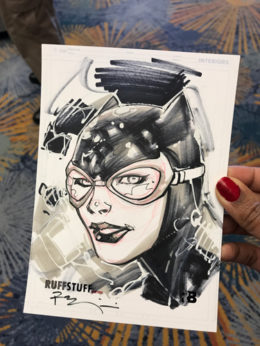
As the panel was wrapping up, the question was posed by People’s World to the panelists on what resources for employment aspiring creators could look to in terms of a collective way of landing jobs. Although the panel acknowledged the importance of apprenticeships, they noted that it can be hard for Black people- in particular working poor Black people- to gain access to them, or complete the programs. Grevioux expressed, “Mentorship is really important. Find someone who is working in the industry and asking them if there is a way to learn from them. You have some writing programs, but the process to get in are ridiculous.” Travis Williams echoed that sentiment, “Those of us who are currently working in the industry know how it feels to not be working in the industry. We remember someone helping us out, and those who are leading now should pay that forward. It’s how progress can be made.”



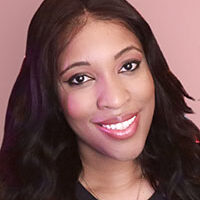
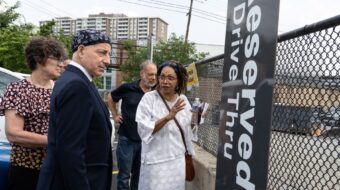
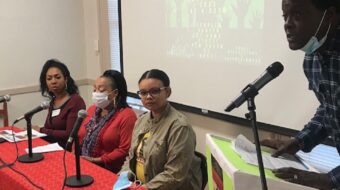
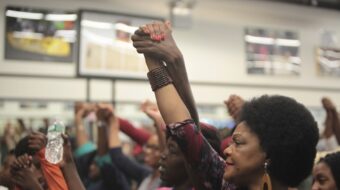





Comments